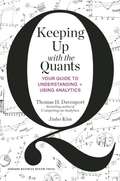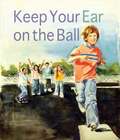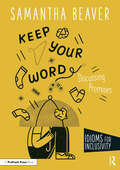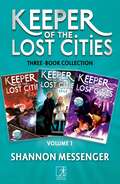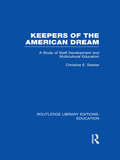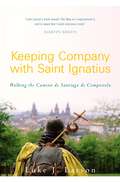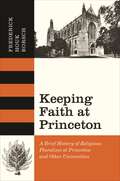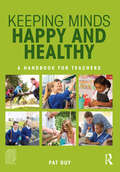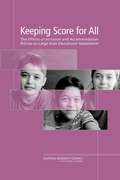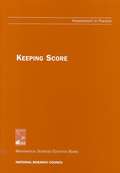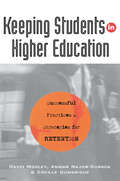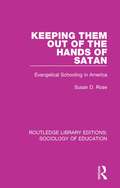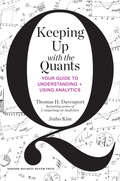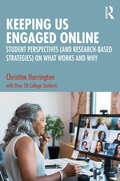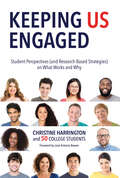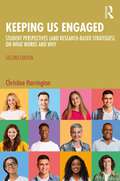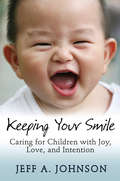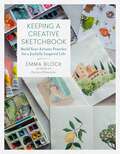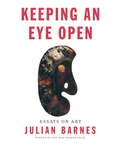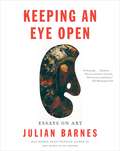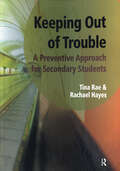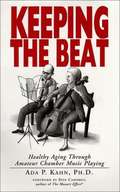- Table View
- List View
Keep Your Ear on the Ball
by Genevieve PetrilloFrom the book Jacket: Everybody wants to help Davey. "Let me open that." "Do you want to hold my hand?" Davey has one answer for all, "Thanks, but no thanks." Davey is blind-and he is perfectly capable of doing everything on his own. His well-meaning classmates stop offering help when they see how able Davey is. They respect his selfreliance-until he tries to play kickball. After several missed kicks and a trampled first baseman, no one wants Davey on his or her team. But by working together, the children figure out a way to offer help that respects Davey's unique abilities and his desire for freedom. In this seamless tale, based on a true story, the children realize that interdependence can be just as important and rewarding as independence.
Keep Your Word: Discussing Promises (Idioms for Inclusivity)
by Samantha BeaverTo get the complete Idioms for Inclusivity experience, this book can be purchased alongside four others as a set, Idioms for Inclusivity: Fostering Belonging with Language, 978-1-032-28635-8. Informed by sociolinguistic research, yet written accessibly, Keep Your Word challenges readers to investigate the act of promising as it relates to both language-use and inclusivity. This engaging and delightfully illustrated book invites students to engage with concepts such as: the cultural meaning of the idiom "keep your word", Speech Acts and Felicity Conditions, two frameworks that linguists use to research and understand promises, why the expectation to "keep your word" can make someone feel excluded, and how understanding the way language works can help learn to be more inclusive. Featuring practical inclusivity tips related to promises, this enriching curriculum supplement can be used in a Language Arts setting to learn about figurative language; in a Social Studies setting to discuss diversity, equity, inclusion, and belonging; or as an introduction to linguistics for students ages 7-14.
Keeper of the Lost Cities Collection: Keeper of the Lost Cities, Exile and Everblaze (Keeper of the Lost Cities)
by Shannon MessengerJump into the epic world of the Lost Cities with this exclusive bundle of the first THREE books in Shannon Messenger's bestselling series! In the electrifying Keeper of the Lost Cities, twelve-year-old Sophie Foster, who has the power to read minds, is forced to leave behind everything she knows and start a new life in the magical world of the Lost Cities, full of other people with incredible powers. Exile sees Sophie settling in to her new life in the Lost Cities – but danger is still afoot. Sophie must risk everything to find the answers to questions that could save not only her life, but the life of someone close to her . . . The nail-biting third book in the series, Everblaze, follows Sophie and her friends as they uncover shocking secrets and face treacherous new enemies . . .Also in the Keeper of the Lost Cities series:Neverseen Lodestar Nightfall Flashback Legacy
Keepers of the American Dream: A Study of Staff Development and Multicultural Education (Routledge Library Editions: Education)
by Christine E. SleeterThis book reports an ethnographic study of thirty teachers from eighteen schools who participated in a staff development programme in multicultural education. The study examines how multicultural education was actually presented to teachers, and areas in which their classroom teaching and perception of students changed over the two-year period. Although most of the teachers reported learning a good deal, changes in their teaching and their discussions of teaching were fairly limited. After reporting the data, the book examines why changes were limited, analyzing three areas: the nature of staff development and how multicultural education was packaged; the structure of schools as institutions; and the identities and life experiences of teachers as White women, often from working class backgrounds.
Keeping An Open Door: Passages in a University Presidency
by Leslie Banner Keith BrodieDuring the 1980s, many of America's most respected colleges and universities suffered financial crises, athletic scandals, a troubling upsurge of racial conflict, and the divisiveness of political correctness "wars." Yet Duke University not only avoided these dangers but changed dramatically from a very good regional university to one of the nation's top research institutions. Its undergraduate campus was hailed as a "hot college"; its Blue Devils basketball team was pronounced a model for student athletes; its graduate and professional schools gained new national prominence; and its scholars were quoted frequently in the popular press on both sides of the political correctness debates.In Keeping an Open Door, Duke chancellor (1982-1985) and president (1985-1993) Keith Brodie and coauthor Leslie Banner recount what it was like to lead Duke during an era of change for research universities across the country: how Brodie reached some of his most controversial decisions, including the "Black Faculty Initiative"; his strategy for precluding abuse in Division I athletics at Duke; how his training as a psychiatrist shaped his leadership style and influenced how he dealt with trustees, deans, faculty, and students; and the avenues of power still open to today's university presidents. The history and feeling of life on the Duke campus during the Brodie era are vividly evoked in photographs and key speeches introduced by the former president's personal recollections.Keeping an Open Door provides an insider's view of issues critical to modern research universities and will interest anyone concerned with the history and future of higher education.
Keeping Company with Saint Ignatius: Walking the Camino de Santiago de Compostela
by Luke Larson Chris LowneyWhen Luke Larson and his wife Evie embarked on a 500-mile pilgrimage across northern Spain, their purpose was to experience walking as a way of keeping company with Jesus and his companions, of both earth and heaven, such as Saint Ignatius of Loyola. Keeping Company is filled with personal, luminously candid, and often amusing stories of the couple’s experiences along the Way of Saint James. More than anything, this book invites you to step off the treadmill of self-effort in your quest to experience God more intimately through the spiritual practice of walking, literally, with God.
Keeping Faith at Princeton: A Brief History of Religious Pluralism at Princeton and Other Universities
by Frederick Houk BorschAn inside look at how religious diversity came to PrincetonIn 1981, Frederick Houk Borsch returned to Princeton University, his alma mater, to serve as dean of the chapel at the Ivy League school. In Keeping Faith at Princeton, Borsch tells the story of Princeton's journey from its founding in 1746 as a college for Presbyterian ministers to the religiously diverse institution it is today. He sets this landmark narrative history against the backdrop of his own quest for spiritual illumination, first as a student at Princeton in the 1950s and later as campus minister amid the turmoil and uncertainty of 1980s America.Borsch traces how the trauma of the Depression and two world wars challenged the idea of progress through education and religion—the very idea on which Princeton was founded. Even as the numbers of students gaining access to higher education grew exponentially after World War II, student demographics at Princeton and other elite schools remained all male, predominantly white, and Protestant. Then came the 1960s. Campuses across America became battlegrounds for the antiwar movement, civil rights, and gender equality. By the dawn of the Reagan era, women and blacks were being admitted to Princeton. So were greater numbers of Jews, Catholics, and others. Borsch gives an electrifying insider's account of this era of upheaval and great promise.With warmth, clarity, and penetrating firsthand insights, Keeping Faith at Princeton demonstrates how Princeton and other major American universities learned to promote religious diversity among their students, teachers, and administrators.
Keeping Languages Alive
by Sarah Ogilvie Mari C. JonesMany of the world's languages have diminishing numbers of speakers and are in danger of falling silent. Around the globe, a large body of linguists are collaborating with members of indigenous communities to keep these languages alive. Mindful that their work will be used by future speech communities to learn, teach and revitalise their languages, scholars face new challenges in the way they gather materials and in the way they present their findings. This volume discusses current efforts to record, collect and archive endangered languages in traditional and new media that will support future language learners and speakers. Chapters are written by academics working in the field of language endangerment and also by indigenous people working 'at the coalface' of language support and maintenance. Keeping Languages Alive is a must-read for researchers in language documentation, language typology and linguistic anthropology.
Keeping Minds Happy and Healthy: A handbook for teachers
by Pat GuyKeeping Minds Happy and Healthy is a practical resource for teachers and shows how pupils can achieve and maintain excellent mental health. It focuses on identifying the main causes of unhappiness, stress and anxiety, by examining the difficulties a school system can inadvertently create for pupils. By developing resilience, empathic behaviour, social skills and self respect during childhood, pupils will better equipped to withstand the pressures of modern society and growing up. With practical tip sheets and advice Keeping Minds Happy and Healthy suggests ways to create a more positive educational experience for all pupils. Pat Guy shows how schools can increase all pupils’ well-being, enabling them to deal with the challenging situations they face as they move through education and into the adult world.
Keeping Score for All: The Effects of Inclusion and Accommodation Policies on Large-Scale Educational Assessments
by Committee on Participation of English Language Learners Students Disabilities In Naep Other Large-Scale AssessmentsU.S. public schools are responsible for educating large numbers of English language learners and students with disabilities. This book considers policies for including students with disabilities and English language learners in assessment programs. It also examines the research findings on testing accommodations and their effect on test performance. Keeping Score for All discusses the comparability of states’ policies with each other and with the National Assessment of Educational Progress (NAEP) policies and explores the impact of these differences on the interpretations of NAEP results. The book presents a critical review of the research literature and makes suggestions for future research to evaluate the validity of test scores obtained under accommodated conditions. The book concludes by proposing a new framework for conceptualizing accommodations. This framework would be useful both for policymakers, test designers, and practitioners in determining appropriate accommodations for specific assessments and for researchers in planning validity studies.
Keeping Score: Assessment in Practice
by Ann ShannonKeeping Score is a brief and well organized consideration of effective authentic assessment.-- Teacher Education Materials Project online
Keeping Secrets (Sweet Valley Twins #12)
by Jamie Suzanne Francine PascalBelieving that she is ready for adult responsibilities in the wake of the Civil War, eleven-year-old Peg meets Violet Hennessey, a woman carrying crucial Union Army information, who asks Peg to assist in her dangerous quest.
Keeping Students in Higher Education: Successful Practices and Strategies for Retention
by David Moxley Anwar Najor-Durack Cecille DumbrigueThis text examines the issues surrounding student drop-outs and presents a practical guide to identifying reasons for drop out and developing solutions to the problem of retaining students in higher education.
Keeping Them Out of the Hands of Satan: Evangelical Schooling in America (Routledge Library Editions: Sociology of Education #62)
by Susan D. RoseFirst published in 1988, this work was the product of extensive fieldwork in two evangelical communities. This in-depth ethnographic study focuses on the meaning systems, organizational structures and the daily lives of the people Susan D. Rose encountered. The study is centred around Christian schooling as a method of socialisation. Tracing the rise of evangelicalism and the development of the Christian School Movement in the latter half of the twentieth century, it examines the kinds of educational alternatives evangelicals have structured for their children. Moving beyond the issue of schooling itself, it analyses the interactions among schooling, ideology, economic structures and the nature of work in contemporary American society, and explores how people relate to one another within the church-family-school network. It addresses the provocative question of why evangelicalism, a self-proclaimed conservative, reactionary movement, held so much appeal for so many Americans at the time of publication. This work will be of particular interest to those studying education and religion and education in the U. S. A.
Keeping Up with the Quants
by Thomas H. Davenport Jinho KimWhy Everyone Needs Analytical SkillsWelcome to the age of data. No matter your interests (sports, movies, politics), your industry (finance, marketing, technology, manufacturing), or the type of organization you work for (big company, nonprofit, small start-up)-your world is awash with data.As a successful manager today, you must be able to make sense of all this information. You need to be conversant with analytical terminology and methods and able to work with quantitative information. This book promises to become your "quantitative literacy" guide-helping you develop the analytical skills you need right now in order to summarize data, find the meaning in it, and extract its value.In Keeping Up with the Quants, authors, professors, and analytics experts Thomas Davenport and Jinho Kim offer practical tools to improve your understanding of data analytics and enhance your thinking and decision making. You'll gain crucial skills, including: How to formulate a hypothesis How to gather and analyze relevant data How to interpret and communicate analytical results How to develop habits of quantitative thinking How to deal effectively with the "quants" in your organizationBig data and the analytics based on it promise to change virtually every industry and business function over the next decade. If you don't have a business degree or if you aren't comfortable with statistics and quantitative methods, this book is for you. Keeping Up with the Quants will give you the skills you need to master this new challenge-and gain a significant competitive edge.
Keeping Us Engaged Online: Student Perspectives (and Research-Based Strategies) on What Works and Why
by Christine HarringtonBuilding from the success of Keeping Us Engaged and dedicated fully to online teaching, this book centers student perspectives on instructional strategies to maximize engagement and increase virtual learning.By pairing stories from 50+ students with the most up-to-date research on online instruction, readers will discover easy-to-implement strategies to help online students develop a sense of belonging, inclusion, and academic confidence. Ranging from topics such as welcome messages and assignment feedback to synchronous and asynchronous discussions, these firsthand student narratives validate and inform faculty practices while inspiring readers to adapt individual techniques to their own online realities. Each chapter is accompanied by insightful reflection prompts ideal for individual use or as discussion points for faculty book groups and professional development workshops.Masterfully founded in student-centered active learning principles and endorsed by the learners themselves, this book is a springboard for all faculty looking to engage students online.
Keeping Us Engaged: Student Perspectives (and Research-Based Strategies) on What Works and Why
by Christine Harrington FO 50 College StudentsThis book offers faculty practical strategies to engage students that are research-grounded and endorsed by students themselves. Through student stories, a signature feature of this book, readers will discover why professor actions result in changed attitudes, stronger connections to others and the course material, and increased learning.Structured to cover the key moments and opportunities to increase student engagement, Christine Harrington covers the all-important first day of class where first impressions can determine students’ attitudes for the duration of the course, through to insights for rethinking assignments and enlivening teaching strategies, to ways of providing feedback that build students’ confidence and spur them to greater immersion in their studies, providing the underlying rationale for the strategies she presents. The student narratives not only validate these practices, offering their perspectives as learners, but constitute a trove of ideas and practices that readers will be inspired to adapt for their particular needs.Conscious of the changing demographics of today’s undergraduate and graduate students – racially more diverse, older, and many employed – Harrington highlights the need to engage all students and shares numerous strategies on how to do so. While many of the ideas presented were used by faculty teaching face to face classes, a number were developed by faculty teaching online, and the majority can be adapted to virtually any teaching environment. Based on student-centered active learning principles, structured to allow readers to quickly identify practices that they may need in particular instances or to infuse in a course as a whole, and presented without jargon, this book is a springboard for all faculty looking for ideas that will engage their students at any level and in any course.
Keeping Us Engaged: Student Perspectives (and Research-Based Strategies) on What Works and Why
by Christine HarringtonThis revised edition of Keeping Us Engaged centers on in-classroom instruction, offering fresh student perspectives on how faculty can maximize engagement when teaching in person.Harrington expertly pairs all new student narratives – a signature feature of this much-loved volume – with easy-to-implement strategies that faculty can use to shift perspectives, strengthen connections with course material, and deepen learning. Topics range from starting positive on the first day of class to developing authentic assignments that push boundaries and giving compassionate, constructive feedback, among other key areas. Each chapter is accompanied by sharply perceptive reflection prompts ideal for individual use or in faculty book groups and professional development workshops.Firmly grounded in active learning principles and enthusiastically endorsed by the learners themselves, this book is an essential resource for all faculty looking to better engage students in traditional face-to-face classroom instruction.
Keeping Your Smile
by Jeff A. JohnsonFilled with warmth, humor, and honesty, Keeping Your Smile is a resource for anyone who cares for children and who wants to manage their own stress, tension, or anxiety before burnout becomes an overarching obstacle in their daily interactions with children. Jeff A. Johnson, a child care professional who wrote about his own burnout in Finding Your Smile Again, offers strategies, activities, tips, and tools help caregivers and educators work with children with passion and maintain a satisfying career in the field. Included are profiles of several professionals who have experienced burnout and survived to become stronger, better care providers.
Keeping a Creative Sketchbook: Build Your Artistic Practice for a Joyfully Inspired Life
by Emma BlockAn inspiring creativity guide for keeping a sketchbook as an artistic practice, with techniques and sources of inspiration for experimenting, drawing, painting, and seeing the world through a colorful lens, from watercolor artist and author of The Joy of Watercolor Emma Block Keeping a sketchbook is a wonderfully rewarding pursuit for artists and hobbyists alike. Your sketchbook is a safe place to explore, experiment, try new things, record your progress, and sometimes mess up, and working in a sketchbook, particularly on location, is an innately mindful practice. You become completely focused on the things you are sketching or painting and completely immersed in the atmosphere of the place. In Keeping a Creative Sketchbook, Emma Block shares her own sketchbook practice and offers inspiring artist interviews and numerous techniques and practices for beginning or transforming your own. Packed with ideas and prompts to get started, this book helps overcome overwhelm and open a world of joyful creativity. With your sketchbook by your side, you can slow down, be present, notice the little things, enjoy the process, let go of perfectionism, and embrace the blank page, discovering rich new depths to your creativity and finding your artist mindset for inner peace.
Keeping an Eye Open
by Julian BarnesAn extraordinary collection--hawk-eyed and understanding--from the Booker Prize-winning, bestselling author of The Sense of an Ending and Levels of Life. As Julian Barnes explains: "Flaubert believed that...great paintings required no words of explanation. Braque thought the ideal state would be reached when we said nothing at all in front of a painting... But it is a rare picture which stuns, or argues, us into silence. And if one does, it is only a short time before we want to explain and understand the very silence into which we have been plunged." This is the exact dynamic that informs his new book. Barnes, in his 1989 novel A History of the World in 10 1/2 Chapters, had a chapter on Géricault's The Raft of the Medusa, and since then he has written about many great masters of nineteenth- and twentieth-century art, including Delacroix, Manet, Fantin-Latour, Cezanne, Degas, Redon, Bonnard, Vuillard, Vallotton, Braque, Magritte, Oldenburg, Howard Hodgkin and Lucian Freud. The seventeen essays gathered here are adroit, insightful and, above all, a true pleasure to read.
Keeping an Eye Open: Essays on Art
by Julian BarnesAn extraordinary collection--hawk-eyed and understanding--from the Man Booker Prize-winning, best-selling author of The Sense of an Ending and Levels of Life. As Julian Barnes notes: "Flaubert believed that it was impossible to explain one art form in terms of another, and that great paintings required no words of explanation. Braque thought the ideal state would be reached when we said nothing at all in front of a painting . . . But it is a rare picture that stuns, or argues, us into silence. And if one does, it is only a short time before we want to explain and understand the very silence into which we have been plunged." This is the exact dynamic that informs his new book. In his 1989 novel A History of the World in 10½ Chapters, Barnes had a chapter on Géricault's The Raft of the Medusa, and since then he has written about many great masters of nineteenth- and twentieth-century art, including Delacroix, Manet, Fantin-Latour, Cézanne, Degas, Redon, Bonnard, Vuillard, Vallotton, Braque, Magritte, Oldenburg, Lucian Freud and Howard Hodgkin. The seventeen essays gathered here help trace the arc from Romanticism to Realism and into Modernism; they are adroit, insightful and, above all, a true pleasure to read.From the Hardcover edition.
Keeping out of Trouble: A Preventive Approach for Secondary Students
by Tina Rae Rachael HayesThe Keeping Out of Trouble programme will enable secondary schools to provide interventions targeted at students who are, or are at risk of, committing criminal offences. By developing the students' awareness of victims, the consequences of their actions and sensitive issues as well as by encouraging students to engage in self-reflection, students will develop the strategies, knowledge and understanding to support themselves in making informed choices about their behaviour and future actions. This essential new resource is based on a programme that was developed by staff in the Youth Offending Team and The Hillingdon Pupil Referral Unit, who recognised that students needed more support. The programme fits in with the Every Child Matters agenda, tackling the 'Be Healthy' 'Stay Safe' 'Enjoy & Achieve' and 'Making a Positive Contribution' aims. The Keeping Out of Trouble programme consists of an initial tutorial session, followed by 16 group sessions and a final self-evaluation and target setting session. These strands of support aim to meet the following objectives: *To enable students to develop consequential thinking *To encourage the development of victim awareness *To develop an understanding of restorative work and ways that they can engage in this kind of work *To enable students to develop an awareness of their own feelings and the ability to label, identify and express these feelings in a safe way *To further develop personal insight, gaining knowledge of strengths and weaknesses and the ability to take structured criticism and feedback *To encourage the development of confidence and self-assurance *To encourage the development of self-reflection skills *To develop an awareness of the consequences of their behaviours - both for themselves and others *To further develop a sense of responsibility and locus of control, that is, to have internal control *To encourage students to further develop and appreciate the perspectives of others, that is, empathy *To encourage students to develop a range of strategies to pre-empt and avoid anti-social and offending behaviours *To encourage facilitators and students to cooperate as joint problem-solvers, engaging in wide ranging discussions around key issues The programme is aimed at: *All young people, especially those who have demonstrated anti-social or criminal behaviour *A group of young people of a similar age *Young people who have not been identified as prolific offenders
Keeping the Beat: Healthy Aging Through Amateur Chamber Music Playing
by Ada P. KahnDust off your clarinet! You can express yourself and improve your health through music. Ada Kahn's Keeping the Beat encourages older amateur musicians who play violins, cellos, flutes, and recorders to make joyful sounds with others.
